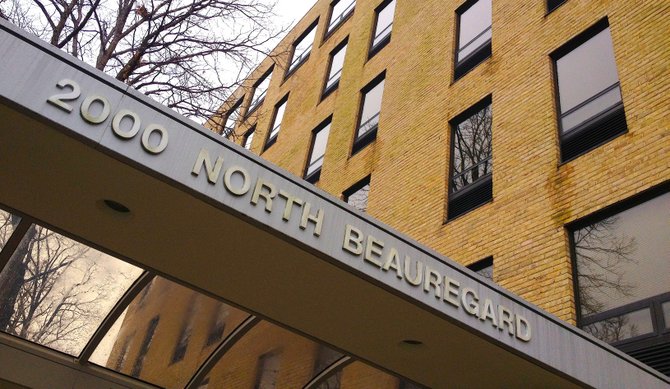The Alexandria Public Schools central office on Beauregard Street. Photo by Michael Lee Pope.
School Board members traditionally try to present a unified front to City Hall, where members of the Alexandria City Council have the final say over how much money is transferred to the Beauregard Street headquarters of Alexandria City Public Schools. But after a contentious budget season, newly elected members of the School Board are divided over one of the top spending priorities of the coming fiscal year — who should get a raise, and how much money should be on the table.
Superintendent Morton Sherman proposed a 2 percent across-the-board salary increase, a move that would cost about $3.6 million and pad the bank accounts of everyone from the senior administrator in the corner office to the math coach who works with teachers. Newly elected School Board member Chris Lewis proposed an alternative, a full step increase for teachers awarded halfway through the year that would cost about $3 million this year. Although a majority of six members approved the amendment Lewis proposed to the superintendent's budget, two members voted against it and one abstained.
"The problem with this is we will be starting the year $2.4 million in the hole next year," said Pat Hennig, one of the two who voted against the measure. "My concern is the impression we may have left as far as being concerned about spending public funds."
Step increases are a way to award longevity, awarding higher pay to employees who have moved up the pay scale by staying at Alexandria City Public Schools long enough to move to the next salary level. The amendment Lewis proposed during the final budget session last week would replace Sherman's across-the-board increase with a full step increase that would be effective midway through the 2013-2014 school year. Budget officials said that would cost about $5.2 million, a price that Lewis said may be too much to handle this year.
"I know it's not everything we probably want to give," said Lewis. "But under the fiscal constraints we are under, it would cost us half the amount."
SCHOOL BOARD members approved an operating budget of $227 million, a 4 percent increase compared to last year. Board members are asking City Council for a $185 million appropriation, which is a 3.3 percent increase compared to last year. Although School Board members have voted for a budget, their work is not finished. They'll have to reconvene after City Council approves a budget and finalize the document, which could still see significant changes.
"We respect the fiscal challenges of the City Council, and we are pleased to provide a budget that is within the targets set by the mayor, council and city manager," said School Board Chairwoman Karen Graf in a written statement. "Having taken office in January, the School Board carefully considered the comments and input from the principals, community members and staff over the past two months.”
The budget includes new reading textbooks for elementary school students and new social studies textbooks for middle school students. It also funds the Family and Community Engagement Centers popularly known as FACE, a program so popular that the threat of reduced funding prompted dozens of parents to stage a revolt during one School Board meeting. One part of the budget that has received scrutiny in recent years is the among of money spent on consultants, a part of the budget known as "purchased services." Newly elected School Board member Bill Campbell said he would like to see a reduction of the $6.8 million budget purchased services to pay for a step increase for the entire school year rather than kicking in halfway through.
"I think we have historically had too many consultants come in and provide training to make us feel good without providing any sustained value," said Campbell. "We need to get away from that."
SCHOOL OFFICIALS are trying to balance the books in a difficult environment, when revenues are constrained and enrollment trends continue to spike. Projections call for enrollment to increase by about 600 students in the coming year, pushing the total student population to just under 14,000. Although the cost of living in Alexandria is higher than many other areas in the region, the percentage of public students who live in poverty is the highest in Northern Virginia — 56 percent.
"The core of this budget is an ongoing commitment to support our students through excellence in the classroom," said Sherman in a written statement. "The addition of ELL teachers, counselors, preschool teachers and related support services maintains our beliefs and continues our improvement through direct and focused instruction."
Now the action moves to City Hall, where members of the Alexandria City Council will have the final say about how much money is transferred to the school system. Although the division has other sources of revenue from the state and federal government, money from the city constitutes the lion's share of the funding. That means School Board members and parents will by lobbying City Council members in the next few weeks, although some board members say they fear the existing division could be used as a wedge to justify reducing the city appropriation.
"We're hoping that we've made our case, and we've explained our position on things, and hopefully they'll be supportive," said Ronnie Campbell, the longest-serving School Board member. "That's democracy."
